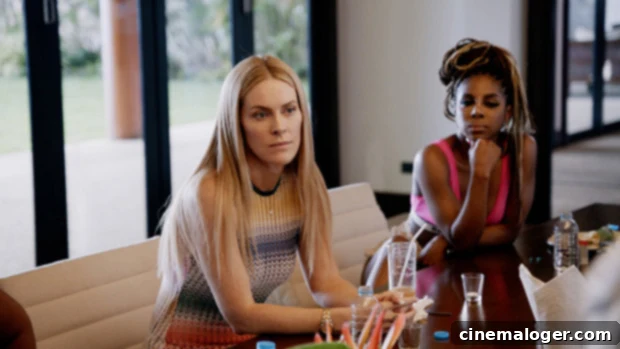Leah McSweeney’s Battle: Mental Health, Sobriety, and the Realities of ‘The Real Housewives of New York City’
In a revealing exposé that sends ripples through the reality television industry, Leah McSweeney, a prominent figure from The Real Housewives of New York City (RHONY), has bravely shared her deeply personal struggle with mental health during and after her time on the hit Bravo series. Her candid account includes a severe depressive episode in early 2022 that necessitated an eight-day stay in a psychiatric hospital, underscoring the often-unseen toll that reality television can take on its participants. This narrative sheds crucial light on the intense pressures and alleged lack of support experienced by those in the public eye, sparking a broader conversation about welfare within the unscripted entertainment landscape.
Leah McSweeney recently opened up about the profound impact The Real Housewives of New York City had on her mental well-being in a groundbreaking Vanity Fair article. This comprehensive story, aptly titled “Inside the Real Housewives Reckoning That’s Rocking Bravo,” was published on October 30th and featured a series of candid interviews with several former housewives. Among those sharing their challenging experiences on the popular Bravo franchise were Leah, 41, alongside outspoken personalities like Bethenny Frankel and Eboni K. Williams. Leah recounted in detail her struggles during season 13 of RHONY, a period significantly compounded by the grief over her grandmother’s passing. The combination of intense personal tragedy and the often-harsh scrutiny from viewers, who reacted negatively to her second season on the show, ultimately led her to inform producers by phone in late 2021 that she would be stepping away from the series. This decision highlights the immense pressure and emotional burden that can accompany public life on a reality TV platform, where personal vulnerabilities are often magnified for entertainment.
Despite her decision to leave the show, the emotional fallout from her time on RHONY and the unresolved grief from her grandmother’s death manifested in a severe and debilitating way. Just a few weeks after notifying producers of her departure, Leah “suffered a major depressive episode,” as revealed in her harrowing interview. The intensity of her psychological distress necessitated immediate family intervention. Her mother, Bunny McSweeney, and the father of her teenage daughter moved into her home, providing crucial emotional and practical support during this critical time. However, her condition worsened, leading to the difficult but necessary decision for her admission to Silver Hill Hospital, a highly regarded psychiatric facility located in Connecticut known for its comprehensive mental health programs. Leah was formally admitted on January 23, 2022, and remained under professional care for eight days. This period represented the maximum duration she could stay under the terms of her health insurance, underscoring the practical and systemic limitations that can often complicate access to sustained mental health treatment even during severe crises. Her hospitalization brought to light the devastating extent of the mental health challenges she faced, exacerbated by her public persona and the relentless demands of reality television.
The compelling Vanity Fair story further delves into Leah’s complex and often tumultuous journey with sobriety, which was significantly impacted by her involvement with RHONY. Prior to joining the show for season 12, Leah had achieved a period of stable sobriety. However, the unique and often volatile environment of reality television, frequently synonymous with social drinking, celebratory events, and dramatic confrontations, proved to be an overwhelming trigger, leading to her relapse during filming. Determined to regain control over her life and health, she courageously got sober again before the commencement of season 13. While receiving critical care at Silver Hill Hospital, Leah squarely blamed “the show” for causing her “emotional trauma” and “exploitation,” articulating a deep sense of betrayal and harm. She elaborated on the origins of her profound “psychological trauma,” stating, “I can say all of that shit is the show, but at the same time I did a deal with the devil so I need to figure out how to deal with it and win but at what cost.” This powerful and poignant metaphor speaks volumes about the perceived Faustian bargain many reality stars feel they make, exchanging personal well-being, privacy, and peace for fame and perceived opportunity, often with unforeseen and deeply personal consequences that challenge their very essence. It highlights the internal conflict of recognizing external pressures while acknowledging one’s own role in entering such a demanding and potentially damaging environment.

Beyond the personal struggles, Leah’s interview also brought forth serious allegations regarding the conduct of RHONY producers, particularly concerning her sobriety journey. She claimed that the production team was not only unsupportive but actively undermined her efforts to maintain sobriety, creating an environment that seemed to prioritize dramatic content over cast welfare. According to Leah, co-showrunner Darren Ward directly told her, with alarming insensitivity, “This shit is boring as hell,” and urged her, “You better turn it up” when she abstained from drinking during filming. These alleged comments suggest a troubling prioritization of on-screen drama and conflict, potentially fueled by alcohol, over the personal health and well-being of the cast members, putting them in precarious positions. Furthermore, Leah alleged that even Andy Cohen, a prominent executive producer and host of the franchise, “looked disappointed” when she informed him that her relapse had not been captured on camera. Such reactions, if true, paint a deeply concerning picture of a production environment that potentially incentivizes problematic behavior and exploits vulnerabilities for entertainment value, thereby creating an adverse atmosphere for individuals striving for sobriety and mental stability. The immense pressure to conform to a dramatic persona, even at the cost of personal health and recovery, appears to be a significant underlying theme in her account, raising serious ethical questions for the industry.
The challenges faced by Leah during her tenure on RHONY were further compounded by an immense personal tragedy during season 13. While committed to maintaining her sobriety, she also had to grapple with the devastating death of her beloved grandmother during filming. This immense personal loss clashed profoundly with the demanding schedule and often insensitive expectations of reality television production, forcing her to navigate deep grief in a highly public and scrutinized setting. Leah candidly admitted her deep regret regarding her decision to go on a cast trip to the Hamptons, a choice made primarily to appease production and fulfill contractual obligations, despite her grandmother being critically ill and her own need for solace. “It hurt so bad that I was not able to grieve,” Leah confided in Vanity Fair, expressing the profound emotional pain of having to suppress her natural grief for the sake of the show’s narrative. She further lamented, “That I had people not showing me any kind of compassion or humanity regarding it,” indicating a perceived lack of empathy and understanding from those around her within the production. This painful account underscores the severe emotional toll that the relentless pace and often insensitive nature of reality TV can inflict, especially when personal crises intersect with overwhelming professional obligations. The inability to properly mourn and the perceived lack of humanity from others left a lasting and painful scar on her mental and emotional landscape.
The culmination of these immense stressors, coupled with disheartening and critical feedback, ultimately led to Leah’s definitive breaking point. While season 13 was airing, Lisa Shannon from Shed Media, the production company behind RHONY, allegedly delivered a crushing blow to Leah’s already fragile state. Leah claimed that Shannon explicitly told her the audience “didn’t like” her because she was sober. This alleged comment, coming after a season marked by profound personal grief, a challenging sobriety journey, and perceived lack of support, was the final straw. It deeply affected Leah, reinforcing her decision to definitively quit the show, as she felt her authentic self and efforts were being rejected. Her departure, however, preceded Bravo’s official announcement that they had fired the entire cast and were rebooting the series with a fresh lineup. This incident highlights the immense pressure cast members face to maintain a certain image or persona, and the potential negative ramifications when they deviate from what producers or perceived audience expectations dictate, particularly concerning sensitive personal choices like sobriety. It underscores the commercial aspects and demands for ‘entertainment’ often overshadowing the human element and well-being of individuals in reality television.
Despite the tumultuous and painful end to her RHONY chapter, Leah ventured back into the demanding world of reality television for season 3 of Peacock’s spin-off, The Real Housewives: Ultimate Girls Trip (RHUGT), which was filmed in the exotic yet high-pressure setting of Thailand in July 2022. However, this experience proved to be another challenging ordeal, far from a peaceful getaway. It culminated in a difficult episode where she suffered a severe panic attack, once again finding herself hospitalized while filming. This recurring pattern of mental health crises during active production raises significant questions about the ongoing support systems and mental health protocols in place for reality TV stars. Several months after the filming of RHUGT 3 concluded, Leah received the disheartening news that she would not be included in RHONY: Legacy, a planned spin-off featuring some of her former co-stars such as Dorinda Medley and Luann de Lesseps. This exclusion, coming after her recent struggles and continuous efforts to be part of the franchise, likely added another layer of disappointment and uncertainty to her professional journey within the reality television landscape, further illustrating the often brutal, unpredictable, and emotionally taxing nature of careers in this highly competitive industry.
The complexities of Leah’s experience with Bravo and its production companies escalated significantly when, shortly before RHUGT 3 began airing in March 2023, she took a monumental and courageous step: filing a discrimination lawsuit. This serious legal action was brought against Bravo, Shed Media, Warner Bros. Discovery, and several key producers, including Andy Cohen. According to her interview with Vanity Fair, the lawsuit explicitly alleges violations of the Americans with Disabilities Act, centering on the claim that she was not adequately supported or reasonably accommodated for her mental health and sobriety struggles during production. This serious accusation posits that the network and production teams failed in their duty to provide a reasonable and safe environment for someone with her vulnerabilities, potentially exacerbating her conditions. Conversely, an attorney representing the defendants vehemently denied Leah’s claims, asserting that they had indeed offered her consistent support amidst her struggles and provided necessary accommodations. However, Leah “maintains those were either subsequently reneged on or she felt weren’t offered in good faith,” suggesting a significant and troubling disconnect between what was perceived as support by the network and what was actually experienced and received by the cast member. This landmark lawsuit represents a critical moment for accountability in the rapidly evolving reality television industry, highlighting the growing conversation around cast welfare, mental health support, and the legal obligations of production companies towards their talent, especially concerning disability accommodations. Its outcome could potentially set a precedent for future legal challenges from reality stars experiencing similar issues, pushing for greater protections and more humane treatment in the industry.
